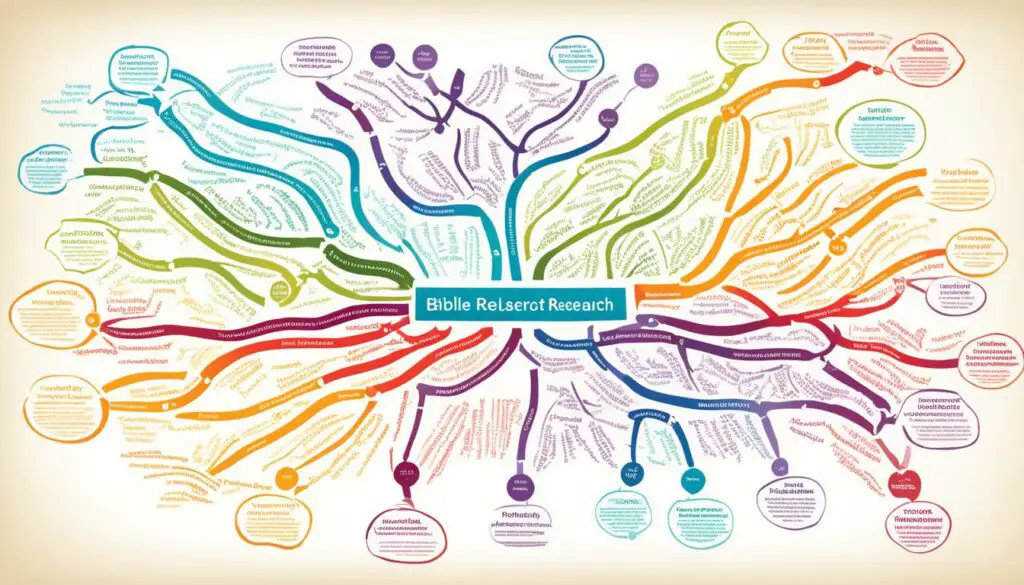A literature review evaluates scholarly articles, books, and related sources on a topic. It looks at how these writings are connected and their relevance to your work. For Bible research, literature reviews show the sources you’ve looked at and how your study adds to this area of research. They are often used in university theses, books, journal articles, and research proposals.

Key Takeaways:
- Mastering literature review techniques is essential for conducting thorough and well-informed Bible research.
- A literature review involves critically evaluating scholarly articles, books, and relevant sources.
- By analyzing relationships between writings, literature reviews help situate your research within the broader academic discourse.
- These techniques are commonly used in academic publications, theses, and research grant proposals.
- Developing strong literature review skills enhances your ability to contribute to the field of Bible research.
Literature Review Strategies for Bible Research
When you research the Bible, using the right strategies is key to understanding the topic well. These strategies make your literature review process better:
- Identify relevant sources: Start by finding sources like articles, books, and online content. These should directly link to what you’re studying.
- Utilize search techniques: Use smart search methods to find info. Look in online libraries and databases. Use specific words and symbols to find the newest material.
- Read critically: Study the literature with a sharp eye. Focus on how they prove their points, what evidence they use, and their final thoughts.
- Organize your findings: Put your findings in a clear order. Use headings to sort your material by themes or questions. This will help you understand it better.
- Take notes: Write down important details and quotes as you go. This saves time later when you write about what you’ve found.
- Analyze and synthesize: Look for patterns and gaps in the info. See how different sources connect or disagree. Use this to build a solid knowledge of your topic.
Using these strategies will help you navigate the wide world of Bible research. They will let you gain deep insights for your study. Always adapt these methods to fit your specific research needs and goals.

Example: Applied Literature Review Strategy
“By using a careful literature review, I looked into various views on Bible texts from feminist theology. I picked strong sources, judged their points, and organized my findings by main ideas. This process showed me where more study was needed. And it let me add my take, making a fresh contribution.” – Jane Smith, Bible Researcher
| Strategy | Description |
|---|---|
| Identify relevant sources | Compile a list of key sources such as scholarly articles, books, and commentaries that are directly related to the research topic. |
| Utilize search techniques | Employ advanced search techniques to explore relevant databases, libraries, and online platforms using specific keywords and operators. |
| Read critically | Analyze the content and arguments presented in each source, assessing the strength of evidence and validity of conclusions. |
| Organize findings | Develop a structured approach to categorize the literature based on themes, theories, or research questions. |
| Take notes | Record key findings, main arguments, and relevant quotes to support your analysis and synthesis later on. |
| Analyze and synthesize | Analyze the relationships and patterns in the literature, identifying connections and discrepancies between sources. |
Benefits of Literary Approaches in Bible Interpretation
Employing literary approaches in Bible study can greatly enhance your understanding. Viewing the text as a story can reveal new insights. It helps to move past simple meanings and see deeper connections.
Looking at the Bible this way, you start to see the author’s goals. Understanding their writing techniques can make your Bible reading more meaningful. You may notice how they use words to capture your attention and deliver their message.
Exploring biblical texts for their style is also beneficial. Noticing things like structure, repeated phrases, and key characters shows the text’s finesse. This approach adds layers to the stories and can transform your reading experience.
By approaching the Bible with literary tools, you connect with its stories in a unique way. This method unlocks fresh insights and inspiration for your spiritual journey.
FAQ
What is a literature review in the context of Bible research?
A literature review in Bible research is evaluating scholarly articles, books, and other sources on a topic. It looks at the connections between different writings. It studies how they link to your research.
Why is a literature review important for Bible research?
Doing a literature review is crucial for Bible research. It gives an overview of explored sources. This shows how your study fits in the field.
It sheds light on what’s already known and what’s not. This helps you lay a solid foundation for your research.
What strategies can I use when conducting a literature review for Bible research?
For your Bible research, you have a few strategies to pick from. Start by looking up sources with specific keywords. Then, check if these sources are trustworthy and reliable.
After that, organize what you find in a clear way. Look for common themes or patterns. Lastly, pull everything together to really understand the topic.
How can literary approaches enhance Bible interpretation and devotional experience?
Here’s why literary approaches matter for Bible study. They focus on understanding texts as whole stories. This helps you see what the writer meant.
You’ll also enjoy texts more by seeing their unique styles, like their structures and choice of words. Including these approaches in your study deepens your understanding and improves your devotion.








